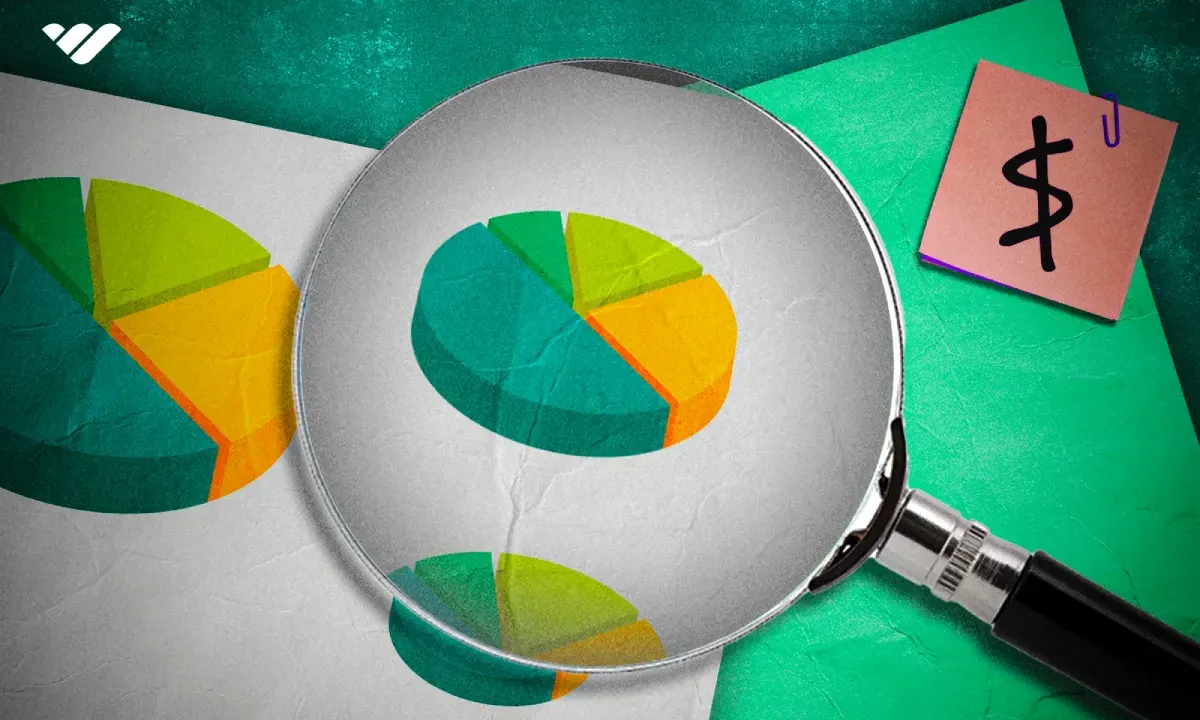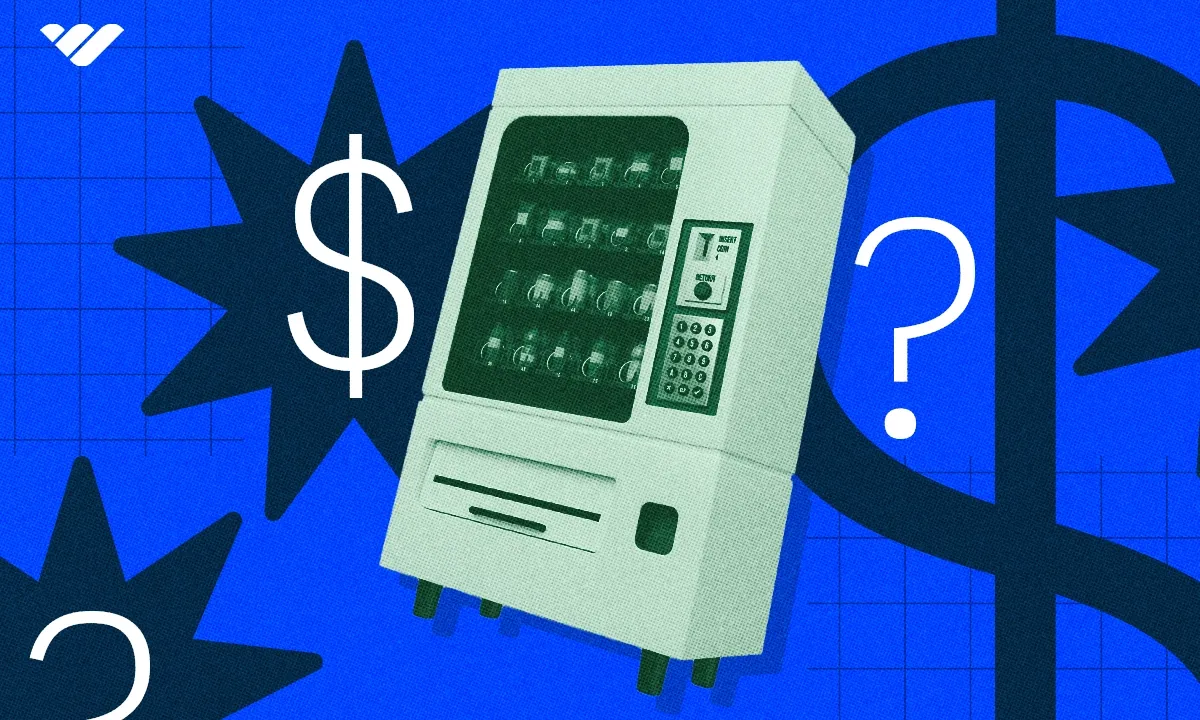Vending machines make for a surprisingly popular side hustle - read this guide to find out why, and learn whether you should start a vending machine business.
Key takeaways
- Location is the single most important factor determining vending machine profitability, outweighing all other considerations.
- A well-placed vending machine can yield 20-40% profit margins and recoup its initial investment within one year.
- Vending machines offer a low-barrier entry into physical business ownership with startup costs of $2,000-$4,000 for standard machines.
While it seems like every aspiring entrepreneur is chasing the latest online business trends or trying to make it in the world of trading or crypto, real-life businesses and side hustles continue to remain an opportunity that shouldn’t be overlooked.
One opportunity in particular stands out for its relative ease of starting and operating, providing the potential for good return on investment and passive income: vending machines.
This guide will break down all you need to know about the vending machine business, including how much you need to get started and exactly how to launch and scale, step-by-step.
We’ll also include specific examples and strategies that successful operators use to make the most money with vending machines today.
So, whether you’re looking to get started with a single machine and build a side hustle, or if your goal is to build a vending machine empire, this guide will be your resource to show you exactly how to achieve this.
Why vending machines are a surprisingly lucrative side hustle

One of the greatest barriers to starting a physical business is the associated startup costs. Unlike online storefronts, particularly those in digital products which can be started with no money, businesses that are launched in-person can sometimes require a significant amount of capital and thus carry a higher associated risk.
Additionally, many physical businesses like real estate, restaurants, and self-storage units can have a complex and time-consuming setup process.
Vending machines, on the other hand, have advantages that make it one of the most approachable physical business models today.
Here’s why:
Low startup costs
One of the most notable advantages to a vending machine business are the low associated startup costs. Even smaller physical operations such as food trucks or a small retail storefront require a minimum of five figures to get started, not to mention the ongoing cost of labor, maintenance, and compliance.
Vending machines on the other hand can be started with as little as a few thousand dollars and have low overhead and still have good upside.
Interested in knowing more about business costs? Read 'How much does it cost to start a business'.
Straightforward operations:
When it comes to a business model, it doesn’t get much simpler than vending machines.
Simply place your machine in a good location, stock it with products people want to buy, and collect money while simply keeping an eye on inventory, restocking when necessary, and performing necessary maintenance.
Also, once you develop an understanding of the basics of machine maintenance and inventory management, you can also run the operation entirely by yourself. There’s a bit more to it than this, but we’ll break these steps down in more detail later in this guide.
Passive income potential:
While running a vending machine isn’t entirely hands-off, it comes incredibly close to having income that is mostly passive. You don’t need to show up every day, the machine can operate 24/7 without staff, and your work simply comes down to maintenance, security, and restocking.
With the right system, you can reduce your work to just a few hours per week, a commitment that isn’t possible with most business models.
Check out: 30+ Passive income ideas
Modern advancements:
Vending machines have come a long way from machines that accept quarters that could sometimes be tampered with, stolen from, or easily damaged.
Today’s machines include those that accept digital payment systems, real-time inventory tracking and sales analytics, and remote monitoring that can send alerts about stock and maintenance needs.
Good return on investment:
A well-placed vending machine with a desirable product can generate returns that outperform many traditional investments. With average monthly revenues of about $500-1500 per month per machine and profit margins of 20-40% after expenses, you can potentially recoup your entire initial investment within as soon as a year.
Numbers can be even higher in prime locations with premium products that have higher profit margins.
Let’s dive in further with a deeper breakdown on how much you can make with vending machines:
How much can I make with a vending machine?
Let’s get right to the most relevant consideration for someone seriously considering a vending machine business: the actual earning potential. While you might see stories on social media of people making thousands of dollars in passive income off of a single machine that they purchased for less than a thousand dollars, it’s important to gain a more realistic expectation surrounding the numbers you might see as a vending machine owner.
If you’re curious specifically about the monthly income of a vending machine, after expenses, moderately successful operators can expect to do anywhere from $1200-$4000 in revenue per month, and after expenses, this usually translates to about $300-$1000 per month in profit.
While it’s possible for a single machine to generate solid income that can be enough to cover a good chunk of monthly personal bills, there are many factors that go into how profitable a vending machine can be.
How much money do vending machines make?

A well-placed vending machine can expect a profit margin of around 30-40% as an ideal target after factoring all costs including ongoing maintenance. However, you need to be aware that many factors contribute to how much money you can make with a vending machine, which include the following:
Factors influencing profitability
Location
The most important factor contributing to whether or not your vending machine business will earn at its full potential is the location.
An ideal location combines foot traffic with demand, low competition, and a match to the local demographic. Remember that high-traffic doesn’t automatically mean profitability: the best performing machines are strategically placed to have reliable and steady customers.
We’ll go more in depth on securing a good location later in this guide.
Product selection
Your product selection can significantly impact your revenue, so if you want to maximize your earnings, you’ll want to sell a top performer that also has high profit margins.
Gather as much data as you can surrounding expected revenue based on competition and demographics, and make sure your products are performing as expected. Test different products to see which perform best, cutting out poor performers in favor of top sellers.
Seasonality
Vending machines can be subject heavily to seasonality, with cold beverages in particular seeing surges during warmer months while dwindling down considerably once it gets cold or rainy.
Additionally, if your vending machine is placed near college students, you’ll see significant drops during summer breaks.
Make sure you adjust your product mix and even pricing to match seasonality, and pay attention to current seasonal sales data your first season to help project inventory management for subsequent seasons.
Product cost and profit margin
In addition to the cost and profit margin of the individual products, you’ll also need to keep in mind the overall maintenance costs and overhead of your specific machine.
Specialized machines might require pricey maintenance and expert technical support in case something goes wrong, so be sure to include projections for breakdowns or damage.
How much does it cost to start a vending machine business?
To give you a more precise idea of exactly how much you need to budget if you want to start a vending machine business, let’s go over the expected costs with a breakdown of all of the associated upfront costs:
Getting started:
Machine
Your most significant investment in this business is the machine itself. The range can be quite wide but be sure to budget at least a few thousand dollars for a good machine.
Newer, more technologically advanced and unique machines can approach the $10,000 range, while most standard machines that stock food or drink will cost $2,000-$4,000.
Business registration fee
While you can buy a vending machine and even inventory without any business registration, if you’re serious about getting into this business, you need to set up properly with formal registration.
The cost and process will vary per region and which business structure you choose, but make sure to do this early, particularly before contacting a location or trying to secure further licensing and permits as having a formally registered business will often be a necessary prerequisite to these further steps.
Location
You will almost always be placing your vending machine within the general area of or directly on the premises of an existing business. While it’s possible to set up an agreement that is largely based on commission, you’ll likely have to pay for rent which normally means you have to pay from the moment you install your machine.
Licenses/permits
Like with any business, particularly those that sell consumables, you can’t set up shop unless you have permission to do so.
With vending machines, the legal requirements will vary based on your region, but they will typically include a business license, health department permits, vending permits, and local operational permits.
Insurance
Another important consideration to the initial costs of a vending machine business is the cost of insurance. While some newer operators might not consider the importance of this, don’t make this mistake because there are many situations that you want to be protected against, including theft, damage, or harm that could be potentially caused to a customer.
Consult with a local operator who is knowledgable in this field and make sure you get a good insurance plan that can cover possible costly situations.
Transportation and installation
Once you’ve picked your machine and selected its location, you’ll need to consider the one-time cost of transporting and installing your vending machine. Make sure to deal with an experienced and reputable operator, and don’t skimp on cost or try to do this yourself as having this done right will save you potential headaches in the long run.
The company that you bought the vending machine from is often the most helpful in this realm, so you should ideally work directly with them if they offer this.
Inventory
Only after you’ve picked a machine and gained the permission and means to install it do you have to start worrying about inventory. For a standard machine stocking regular snacks and beverages, expect to invest about $500-$1000 in initial inventory. Make sure to budget enough to fill the machine and have a diverse enough set of products so you can gain insights on which are most popular and profitable.
Inventory is the main expense that is associated with the continual operation of your vending machine business as it is the lifeblood of your entire business.
Let’s continue with more ongoing expenses that you’ll need to keep in mind:
Ongoing expenses
Restocking
While you can project how regularly you’ll need to restock and how much this will cost, you won’t actually know how much this will cost until you’re actually live and have collected data over time.
Continue to adjust the amounts and types of inventory you’re buying based on all of the information you’re seeing while operating the business, and make sure to incorporate this in your financial projections and expected profitability, particularly if you plan to scale to other locations.
Location rental/commission fees
As stated earlier, you’ll almost always be doing business with the owner of the property that your vending machine is located on. Most location owners will expect a commission of 10-25% of your gross sales–not your profit margins–so it’s possible to lose money even if you’re making revenue if you’re not getting enough sales.
You’ll likely also have to pay flat rent to the owner, which will vary based on the location.
Make sure to get a contract and terms in writing and factor them into your financial projections before committing to any specific location
Ongoing maintenance and repairs
Regular maintenance is a necessary associated cost of operating a vending machine business. This cost will largely come down to the machine that you decide to buy.
Be sure to look up reviews and do research on previous owner’s experiences for a specific model you’re looking for. Forums and private groups are the best places to get recent and accurate data in this area.
Payment processing
While you can operate a vending machine business that is cash-only, in today’s age, that would be a costly mistake. With more businesses going cashless and a growing group of consumers expecting card-friendly payment options as a result, you’ll greatly increase your sales if your machine accepts cards.
This comes with a payment processing fee for the associated bank or credit card, which is typically around 2.7% + $0.30 per transaction and needs to be factored into ongoing costs.
How to start a vending machine business on a budget

If you want to launch a vending machine but you’re on a budget, or if you simply want to launch one for the lowest cost possible, take advantage of the following practices that will help you cut costs when starting your vending machine business:
Buy a used machine
One of the easiest ways to reduce your initial investment is to start by buying a used machine. Quality used machines that are still fully functional can be found for up to 50% less, and it often makes little difference compared to buying a new one, particularly if it was a reliable machine that was well-maintained.
However, buying a used machine has some inherent disadvantages, namely their availability and the need to thoroughly inspect the machine before committing to a purchase that is often non-reversible.
So, if you want to buy a used machine, be sure to buy it from a reputable source and consider hiring an expert to help you ensure its functionality, and if you’re looking for a specific model, scour all marketplaces to see if you can find it used before buying it new.
Learn basic maintenance
Complex repairs should always be left to professionals, but some vending machine owners have unnecessary additional overhead from maintenance that they could be performing themselves.
For example, physically taking care of restocks is something you should learn, in addition to simple troubleshooting that can often be learned by reviewing the manual and instructions that your machine comes with.
Negotiate commissions and rent
The commission and rent you pay to your location significantly impact your bottom line, and sometimes, if you ask, you can negotiate and save on these. This might be harder to do in the beginning, but it becomes more possible as you establish a history with the business.
Do your best to make it a win-win and bring up good reasons when negotiating: for example, if your machine is producing more revenue than others in the location, you can justify a lower percentage as you are earning the business more based on your volume.
Which vending machines make the most money? Top performing vending machines

Choosing what type of machine you decide to buy and the type of products it stocks is one of the most important considerations when determining the overall viability of your business.
While specific product demand will vary by the exact location and demographics, in general, these are the most profitable types of vending machines:
Traditional food, snacks, and beverage
Amongst the newer trends in vending, traditional snacks and beverage machines continue to be reliable money makers simply because some people have built a lifelong habit of seeking out machines with familiar options.
Popular brand names and stereotypical vending machine stock like Coca-Cola drinks and well-known candy and chips can produce steady sales and gain loyal customers, so sometimes there’s no need to try to innovate on a model that is proven to work.
Health-conscious options
With a growing group of consumers becoming health-conscious, it can be a good idea to break the stereotype of vending machines being associated with unhealthy foods by serving up healthy options.
You can look up newer suppliers and machine franchises that have an offer that has proven to convert in this niche with products like organic snacks, plant-based alternatives, and protein-dense, low-carb options.
Another benefit to this niche is that consumers will often pay a premium, particularly for organic, but you need to make sure you’re in a location that is dense with your target demographic as otherwise sales can flop.
Specialty machines
Specialty machines such as those offering premium coffee, smoothies, ice creams, or even cake or pastries have the potential to stand out and generate more profit than products that people typically expect when seeing a vending machine.
Additionally, your location partner might be more likely to accept you and offer lower rates if your machine has the potential to draw more foot traffic to their business.
Novelty items or services
Vending machines have been pushing the boundaries when it comes to innovation in recent times, with examples like machines carrying items like single-serving cologne or perfume or even performing services such as shoe or phone cleaning.
However, these machines will often require a much higher upfront cost compared to traditional machines and can be very hit or miss, so be sure to do research before taking the gamble with a unique machine.
How to start your vending machine business in 6 steps
Are you ready to actually get started with your vending machine business? Now that you’ve been informed with some foundational knowledge regarding expectations, costs, and setup, it’s time to go over the systematic approach that vending machine pros use to help ensure their success.
Here’s how you start your vending machine business, step-by-step:
1. Initial research and planning
Before you invest any money, it’s important to get an in-depth picture of the viability of your intended vending machine by performing local market research.
Make sure you dive in and measure the following:
Overall market and competition
One of the most influential factors to the performance of your vending machine business is the status of the current competition. Take note of locations, prices, how long they’ve been around, how popular they seem to be, and what they’re offering.
Do your best to gauge if there’s room in the market to offer a better option or an innovative option that is in-demand with little existing options: for example, a natural and healthy vending machine to be presented as an attractive alternative in a place where there are only highly processed, high-sugar or high-fat treats.
Availability
You can’t just put a vending machine anywhere you’d like, so before you jump in, you need to make sure that there’s space actually available. Many prime locations will already have existing contracts with vending companies, and some property owners might not be interested in having vending machines at all.
Start by identifying potential locations and reaching out to the owner or property manager to discuss the possibilities and relevant information like the terms and intended contract duration of current vendors and what machines are allowed before getting too invested in a specific location or machine type.
Demographics

As with any business, the local demographic has a huge impact on how well a product sells. In addition to anecdotal research and insightful assumptions that you might have as a local, do your best to gather data surrounding income levels, spending habits, age ranges and food preferences to find a gap in the market that your vending machine can fill.
In addition to the consumer profiles, gain an understanding of peak traffic times, work patterns, and seasonality to help you more accurately assess what type of machine or product will do best in your area.
Pricing strategies
Your profitability will largely be determined by your pricing strategy. In general, you’re free to choose the price for the products in your vending machine, but you need to reference your market research to see what your demographic is willing to pay and how much competition is charging in a similar location.
Balance a healthy margin with being competitive against competition, and the less competition and more urgency your customer has, the higher you can price–think high prices at airports.
2. Legal and financial setup
Once you’ve completed your market research and confirmed the viability of your vending machine business, it’s time to set up the legal and financial foundation. Here’s exactly what you need to focus on:
Review local regulations
The first thing you need to check with your vending machine business are the local regulations and requirements. Every jurisdiction and specific location will have different rules about vending machines, particularly those selling consumables like food and beverages.
Make sure to read up on your local health department’s requirements to understand which permits you’ll need to get.
Business formation and registration
Most successful vending machine operators will choose to set up a business structure that is separate from a sole proprietorship like an LLC for the liability protection it offers.
Once you’ve picked your structure, make sure to register with your local authorities, obtain your tax identification numbers, and apply for and acquire any necessary licenses or permits.
Set up your finances

The first step of setting up your finances is opening a dedicated business bank account to funnel all of your vending machine revenue through that is associated with your corporation.
If necessary, seek financing with loans and make sure to prepare any necessary documents or a thorough business plan to help you get more funding if you need to raise money to buy your machines.
Secure insurance coverage
As mentioned earlier, getting insurance for your vending machine business is something that is often overlooked but is a step that shouldn’t be skipped especially because of the potential downside that will come should you run into issues without coverage.
Coverage such as general liability, product liability, equipment coverage and more is often worth it. Speak to a reputable agent that is familiar with vending machines or ask other vending machine owners for advice to see which plan makes the most sense.
Set up an accounting system
Proper financial tracking from day one will save you headaches in the long run. Make sure you implement spreadsheets or accounting software that handles inventory, tracks sales, and logs all expenses so you have a precise idea of how profitable you are at any given moment.
Understand your tax liabilities as well and make sure you’re prepared with an accountant if necessary so things go smoothly come tax season.
3. Settle on a machine and supplier
One of the most important decisions for your vending machine business is the type of machine that you end up buying. Read reviews and get an understanding of the expected ongoing maintenance costs.
If buying used, make sure to thoroughly vet the seller and make sure you’re paying a fair price. Make sure to read the terms and conditions of your purchase including the warranty coverage and support or ongoing service that might be offered with it.
After buying the machine, you will have to separately find a supplier for the inventory inside of it. If you’re selling typical stock, sources such as David’s Vending and Vending.com are popular sources for finding wholesale goods at fair prices to stock your machine with. For specialized goods, your vending machine supplier will likely have contacts for inventory suppliers or may even supply themselves.
4. Select a location
While you can always possibly move your vending machine to a new location, it’s better to get this right from the beginning with proper research. The first thing you need to do when picking a location is analyzing the foot traffic and any competition. Sometimes it’s better to place yourself alongside existing machines selling different goods as it shows that there is a proven market.
You’ll have to get in touch with the property owner or manager to figure out the terms surrounding your vending machine placement, including any rent, commissions, or electricity costs. When you settle on a location, make sure to strike up a formal and clear agreement with whoever you’re paying rent or commission to–this will often be done in the form of a contract.
5. Manage inventory, track numbers

Once your vending machine is live, you’ll need to closely monitor your numbers to make sure you are running an operation that is as efficient and profitable as possible.
Good inventory management means tracking the best sellers and adding to them while noticing the slow movers and reducing or eliminating them. If selling products with impending expiration dates, make sure to order efficiently, doing your best to order as close as possible to the exact amount of stock that can be sold before your product expires.
6. Scale
Continue to optimize and review data over time to understand whether or not your vending machine is performing at its peak performance, and if you find the process to be both profitable and enjoyable, consider scaling with another machine in another location. Each location and machine is different, so understand that although you may have gained a lot of experience with the first one, the second could throw curveballs or result in completely different sales numbers.
It’s also possible to scale and automate a single vending machine by continuing to tweak and optimize until you reach your desired profitability, switching products and pricing, even testing marketing methods to see if that can help increase sales.
Where to put your vending machine to make the most money
If you want to cash in big with a prime location, you will often have to pay a premium in terms of rent and a higher commission. However, no matter how much money you have, sometimes you can’t buy a location simply because of regulations or limited space. This is particularly relevant in the case of putting a vending machine somewhere like a mall or an airport, which are well-known to be the most profitable locations for vending machines.
Here are some other prime locations for vending machines:
Close to nightlife
Entertainment districts and streets that are packed with bars offer incredible amounts of foot traffic and potential late-night customers who might want food or drink when other options are closed. Competition can be higher and installing machines on the street might come with greater risk and more complicated setup and permits, but the rewards can be big.
Business locations
Office and industrial areas will provide consistent foot traffic during work hours and can capture people who are stuck in one location with limited options. Additionally, since the same people frequent these buildings, you have the potential to build loyal repeat customers.
Transportation hubs
Hubs for transport like bus and train stations will bring travelers who might be looking for a quick fix or to stock up on refreshments for the journey ahead of them. Airports in particular are a vending machine goldmine, and although it may be expensive and complicated to set up and secure a location, these are known to offer the highest profit margins for its vending machine owners.
Schools or universities
Educational institutions will always be a reliable source for crowds of students and staff who pass by each day by the thousands throughout the school year. While you’ll need to navigate competition, specific regulations, and downtime during breaks, you can cash in big with a well-placed vending machine inside of a school or university.
Service locations
Car service centers, laundromats, and other places with waiting lobbies are often good places to offer a snack or refreshment because customers are already spending time waiting and might want something to make their time more pleasant. As long as there is physical space in these areas, many business owners will be happy to set up a commission based agreement because you will be taking on all of the upfront risks and all associated costs.
Tips for succeeding with your vending machine business
If you’ve read and digested everything inside of this guide, you’re already equipped with solid foundational knowledge covering all of the basics when it comes to the vending machine business.
However, although the business is fairly straightforward, certain strategies and perspectives can greatly boost your potential for success.
Here are what top performers in the industry focus on to maximize returns:
Location is key
It’s never too much to emphasize how important location is to the success of your vending machine. Experienced operators spend a significant time researching, planning, and negotiating to snag a premium spot. Getting in early on a new development such as a mall or airport expansion is one way to secure your spot in a highly profitable location that will likely become unavailable in the future due to its extreme profitability that will retain its tenants.
Accept as many payment methods as possible
Adding payment options that includes contactless card payments or even crypto will greatly increase your revenue compared to operators that only accept cash. Not only does this increase revenue, it makes accounting and viewing analytics much easier as you can see exactly when transactions are coming through, allowing you to easily visualize peak times.
Smart alerts for restocks
Your vending machine should never be sold out. Although it’s a good sign to sell out in the beginning, you should quickly adjust to replenish ASAP as empty slots are an ongoing opportunity cost. Newer vending machines will have smart alerts that will let you know when product is getting low so you can always have full slots, so take advantage of this technology as the higher price is often worth it due to the convenience they present for managing and replenishing inventory.
Unique, compelling items
Some of the most profitable vending machines are those that are selling novel items. Not only do these products offer greater profit potential due to price points that might often be higher, you’ll also benefit from word of mouth if your vending machine is truly unique.
Having a unique machine in a location that best suits your target audience is a winning combo–an example could be single-use fragrance and gum or mouthwash dispensing close to a street full of bars and night clubs.
Achieve side hustle success with Whop
While the vending machine business is a great entry point into ownership of a physical business that is relatively cheap to start and includes other perks like straightforward operation, potential for mostly passive income, and scalability, becoming successful requires dedication and sticking to strategies explained in this guide.
At the end of the day, vending machines are just one of many methods that creative entrepreneurs and side hustlers are using to make money–if you want to read more about how to launch, run, and succeed in business, check out all of our latest posts on the topic here.
Join a dedicated entrepreneurial community on Whop today

Whop is home to expert-led, private communities that are dedicated to the success of all their members. Among the many different types of communities that cover all things online money and entrepreneurship, there are several business-focused groups that can help you level up and reach your goals.
So, if you want to succeed with vending machines or any other business venture, check out all of the expert-led business groups on Whop. The best way to succeed is by following in the footsteps of others.
FAQs
How much per month can I make with a vending machine business?
Although income will vary based on location, profit margins, and overhead, a single well-placed vending machine stocking profitable product can generate net monthly profits in the $300-$1000 range. Owning multiple successful machines opens up the potential to earning an income of a few thousand dollars a month or more from vending machines alone.
Is a vending machine business passive income?
While vending machine businesses are largely hands-off, they’re not completely passive income as you’ll need to handle regular restocking, routine maintenance, inventory management, and addressing of any issues that arise. As your operation becomes larger, you could potentially hire staff to delegate busy work and maintenance to collect passive profits as the owner.
How much ROI does a vending machine generate?
After accounting for all expenses, a profitable vending machine can generate 15-40% annual ROI once the original investments are recouped. Used machines can pay for themselves faster, often in less than a year. Combined with relatively low overhead compared to other physical businesses, these numbers put vending machine businesses in the upper realm of profitability in terms of ROI, albeit with smaller revenue numbers.
Can I put a vending machine anywhere?
While it might be physically possible to put a vending machine anywhere that there is room and electricity, you can’t just put one wherever you’d like. Before putting a vending machine anywhere, you’ll need the necessary permission from both your local authorities and the owner of the property that you will put the vending machine on.
Do I need business insurance for my vending machine business?
Although it’s not required to have business insurance for your vending machine operation, it’s highly suggested to do so if you don’t want to be fully liable financially or legally in case anything goes wrong, so factor this into your costs and financial projections. Securing general liability insurance and equipment insurance is a good starting point.



